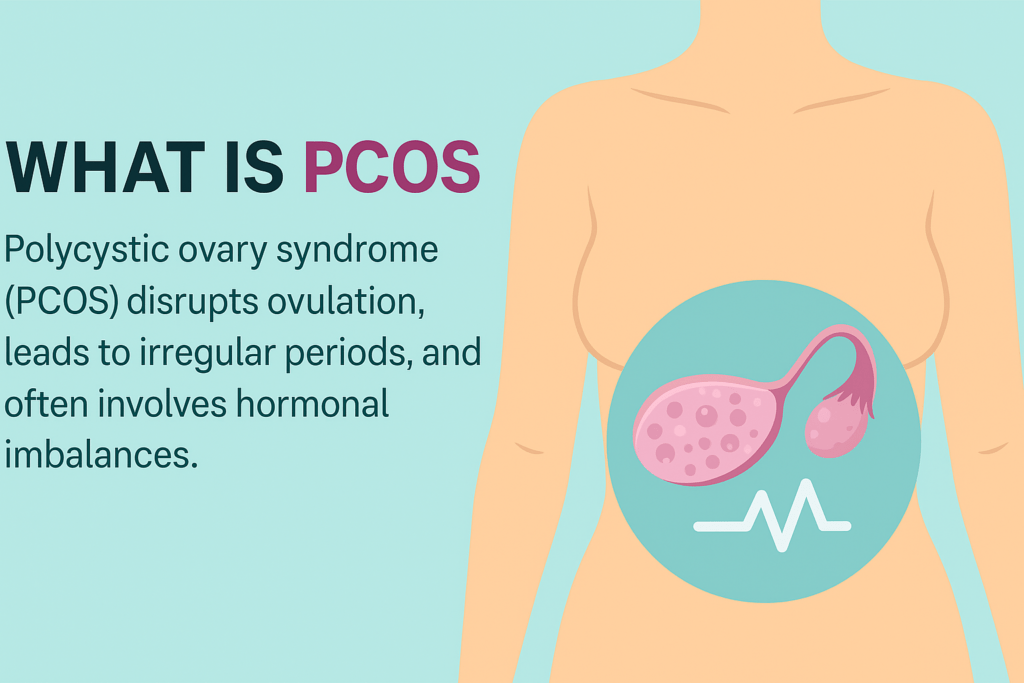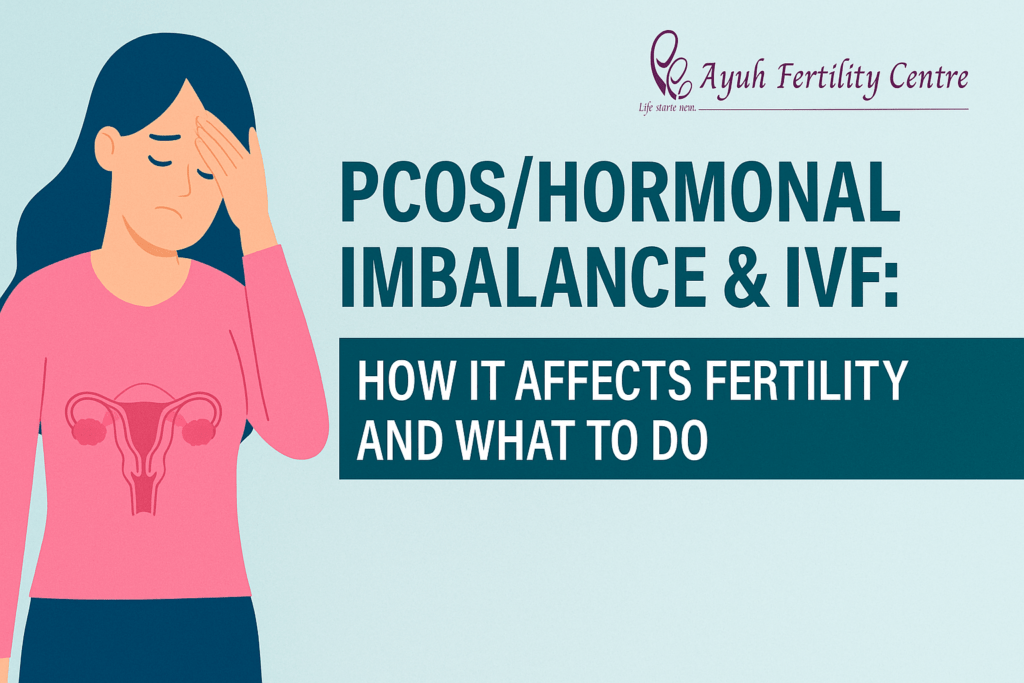For many women, becoming a mother is one of life’s biggest dreams. But sometimes, conditions like PCOS/Hormonal Imbalance stand in the way. PCOS (Polycystic Ovary Syndrome) is one of the most common hormonal disorders in women of reproductive age. It affects nearly 1 in 10 women worldwide, often leading to irregular periods, difficulty in conceiving, and higher risk of infertility.
At Ayuh Fertility Centre, Ahmedabad, we meet many women who feel confused and frustrated by PCOS/Hormonal Imbalance. The good news is that with the right lifestyle changes, medical guidance, and IVF support, many of them go on to become happy mothers.
Let’s explore how PCOS and hormonal imbalance affect fertility, why IVF can be an effective solution, and what you can do to improve your chances.
What is PCOS?
Polycystic Ovary Syndrome (PCOS) is a hormonal disorder where the ovaries produce excessive androgens (male hormones). This disrupts normal ovulation and causes small cysts on the ovaries.

Common signs of PCOS include:
- Irregular or missed periods
- Excess facial/body hair
- Weight gain or difficulty losing weight
- Acne and oily skin
- Hair thinning on the scalp
- Difficulty conceiving
PCOS doesn’t just affect fertility—it can also increase the risk of diabetes, high cholesterol, and heart disease if not managed properly.
How PCOS/Hormonal Imbalance Affects Fertility
- Irregular Ovulation: Women with PCOS often don’t release eggs regularly, making it harder to conceive naturally.
- Poor Egg Quality: Hormonal imbalance sometimes affects egg development, leading to fewer healthy eggs.
- Hormone Imbalance: High insulin and testosterone levels disturb the natural reproductive cycle.
- Thin Uterine Lining: Hormonal imbalance may affect implantation of the embryo.
- Higher Miscarriage Risk: PCOS can sometimes increase early pregnancy loss.
At Ayuh Fertility Centre, we carefully evaluate each patient to understand how PCOS is affecting her body before suggesting the right treatment plan.
IVF for Women with PCOS
IVF (In Vitro Fertilization) is often a successful option for women with PCOS. Here’s how it helps:
- Controlled Ovulation: IVF medications stimulate the ovaries to produce multiple eggs, even if natural ovulation is irregular.
- Healthy Embryo Selection: IVF allows doctors to choose the best quality embryos for transfer.
- Reduced Miscarriage Risk: Techniques like PGT-A (genetic testing) can identify chromosomally normal embryos.
- Higher Success Rates: With the right care, IVF success rates for women with PCOS are comparable to women without PCOS.
- Personalized Care: At Ayuh, we adjust medication doses to prevent complications like OHSS (Ovarian Hyperstimulation Syndrome), which PCOS women are more prone to.
Lifestyle Habits to Improve IVF Success with PCOS
When you’re managing PCOS/Hormonal Imbalance, lifestyle choices can make a real difference—not just for natural fertility but also for IVF outcomes. At Ayuh Fertility Centre, we’ve seen how simple daily changes can boost egg quality, regulate cycles, and improve pregnancy chances.
1. Healthy Diet
Eating a balanced diet helps control insulin resistance, which is common in PCOS.
- Include: whole grainA fertility-friendly diet balances hormones, supports ovulation, and helps control insulin resistance (common in PCOS).
- Include: fresh vegetables, fruits, whole grains, pulses, omega-3 rich fish, walnuts, flaxseeds, and lean protein.
- Limit: refined carbs (white bread, sugary snacks), processed food, fried items, and excess caffeine.
- Tip: Focus on smaller, frequent meals to prevent sugar spikes. Many Ayuh patients who adopted this approach saw more regular cycles within 3 months.s, leafy vegetables, lean proteins, nuts, and seeds.
- Avoid: processed sugar, fried foods, and refined carbs.
2. Regular Exercise
Exercise reduces insulin resistance, balances hormones, and improves blood flow to the reproductive organs.Tip: Aim for 30 minutes, 5 days a week. Couples exercising together often find it reduces stress and strengthens emotional connection too.Good choices: brisk walking, swimming, yoga, cycling, and pilates.Avoid: extreme cardio or overtraining, which may suppress ovulation.
3. Weight Management
Even small changes in weight can improve IVF results for women with PCOS.At Ayuh, we provide personalized nutrition + exercise plans so women can reach a healthy weight before IVF treatment.Losing 5–10% of body weight helps restore ovulation and makes IVF medications more effective.Being underweight can also disrupt fertility; gaining healthy weight may restore balance.
4. Stress Reduction
Stress creates hormonal imbalance and worsens PCOS symptoms. Managing it is crucial.Ayuh’s support: Our fertility team offers counseling sessions to help couples cope with IVF-related anxiety.Try: meditation, journaling, breathing exercises, reading, or pursuing hobbies.Science says: high cortisol (stress hormone) directly interferes with reproductive hormones.
5. Good Sleep
PCOS and poor sleep are strongly linked. Lack of sleep affects hormones like insulin, leptin, and cortisol, all of which impact fertility.Try relaxing teas (like chamomile) and a fixed bedtime routine.
At Ayuh, we consider sleep hygiene as important as diet and exercise when preparing for IVF.Aim for 7–8 hours of deep sleep daily.Switch off screens at least 1 hour before bed.
6. Quitting Smoking & Alcohol
Smoking and alcohol worsen PCOS and lower IVF success rates.
- Smoking: reduces egg reserve, causes DNA damage, and leads to poor-quality embryos.
- Alcohol: disrupts ovulation and affects hormonal balance.
- Hopeful note: Once patients quit, improvements are often visible within a few months. At Ayuh, we’ve seen couples with long infertility histories succeed after giving up these habits.
7. Medical Guidance & Regular Checkups
Lifestyle alone isn’t always enough—regular medical checkups ensure PCOS and related hormonal issues (thyroid, insulin, prolactin) are managed.
- Regular scans and blood tests track progress.
- Early detection of hormonal issues makes IVF smoother.
At Ayuh, we combine medical treatments with lifestyle advice for the best results.
Emotional Impact of PCOS and IVF
PCOS can feel overwhelming. Irregular cycles, difficulty conceiving, or weight struggles often affect self-esteem. IVF also brings emotional ups and downs. At Ayuh, we understand this journey is not just medical but deeply personal. That’s why we offer counseling and emotional support to help women feel empowered rather than helpless.
Real Patient Story at Ayuh Fertility Centre
One of our patients, Neha (name changed), had been trying for 4 years. She had PCOS, irregular cycles, and multiple failed treatments elsewhere. When she came to Ayuh, we focused on lifestyle changes alongside IVF. With a customized diet, weight loss plan, and IVF with embryo selection, she conceived successfully on her second cycle. Today, she’s the proud mother of a healthy baby girl.
🙋 FAQs
Find answers to common questions about IVF treatments, success rates, and fertility care at Ayuh Fertility Centre, Ahmedabad.
1. Can lifestyle changes alone help women with PCOS/Hormonal Imbalance conceive?
Yes, in many cases, lifestyle changes can restore ovulation and improve fertility naturally. A balanced diet, weight management, stress reduction, and proper sleep can regulate cycles and improve egg quality. However, some women with severe PCOS may still need medical assistance like ovulation induction or IVF. At Ayuh Fertility Centre, we encourage starting with lifestyle modifications, because even if medical treatment is needed later, these changes significantly boost the chances of success.
2. Does PCOS/Hormonal Imbalance always require IVF for pregnancy?
No, not always. Some women with PCOS conceive naturally after improving their lifestyle and receiving basic treatments like medication to induce ovulation. IVF is usually recommended if simpler treatments fail or if other fertility factors are involved. At Ayuh, we use IVF for PCOS patients when natural conception isn’t possible or when time is critical. Our approach is step-by-step, ensuring couples only move to IVF when truly necessary.
3. Can lifestyle habits improve IVF success in women with PCOS?
Absolutely. Studies show that women with PCOS who adopt healthy habits before and during IVF cycles have higher pregnancy rates. Habits like eating low-GI foods, exercising moderately, and reducing stress help improve egg quality and embryo implantation. At Ayuh Fertility Centre, we integrate lifestyle counseling into every IVF plan because healthy choices not only increase success rates but also make pregnancy safer.
4. Why do women with PCOS/Hormonal Imbalance face more IVF complications?
PCOS patients sometimes produce too many eggs during ovarian stimulation, leading to a risk of OHSS (Ovarian Hyperstimulation Syndrome). Hormonal imbalances may also affect egg quality. That’s why close monitoring, adjusted medication doses, and healthy lifestyle habits are critical for safety. At Ayuh, we specialize in managing IVF for PCOS patients with personalized care, preventing complications while improving outcomes.
5. How soon can PCOS/Hormonal Imbalance patients expect results after lifestyle changes?
Lifestyle changes take time, but improvements often start within 3 months. For men, it takes about 74 days for new sperm to develop, and for women, better hormone regulation can lead to more regular periods within weeks to months. At Ayuh, we advise couples to make lifestyle changes at least 3–6 months before IVF to maximize chances of success. Many women notice reduced symptoms, regular cycles, and better IVF response after adopting consistent healthy habits.
Conclusion
PCOS/Hormonal Imbalance is a challenge, but it doesn’t have to stop your dream of parenthood. With the right combination of lifestyle habits, medical support, and advanced treatments like IVF, success is possible.
At Ayuh Fertility Centre, Ahmedabad, we specialize in treating PCOS-related infertility. Our holistic approach—combining lifestyle counseling, emotional support, and advanced IVF techniques—has helped many women become mothers.
💜 Remember: PCOS may delay your journey, but it doesn’t define your destination. Parenthood is still within reach.


